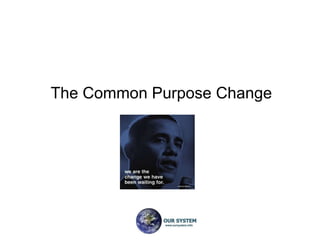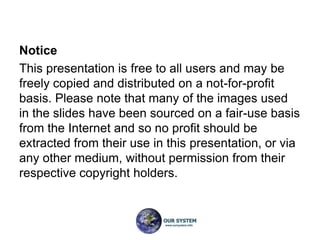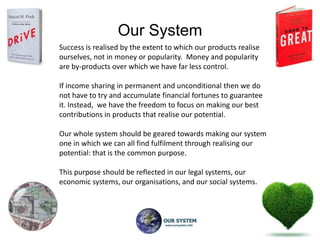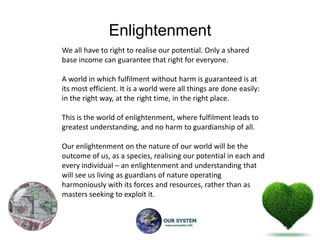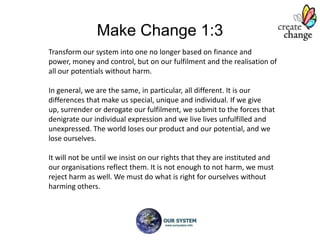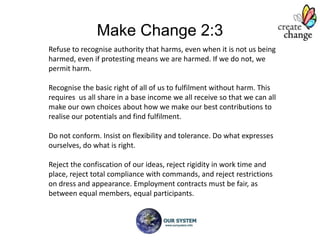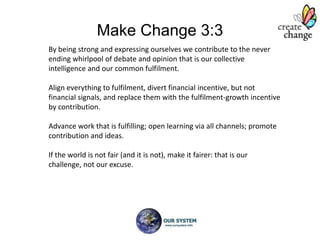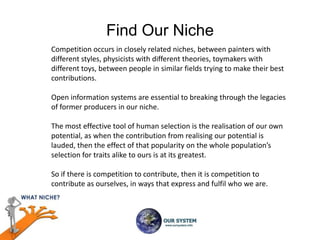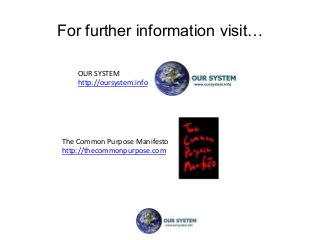The Common Purpose Change
- 1. The Common Purpose Change
- 2. Notice This presentation is free to all users and may be freely copied and distributed on a not-for-profit basis. Please note that many of the images used in the slides have been sourced on a fair-use basis from the Internet and so no profit should be extracted from their use in this presentation, or via any other medium, without permission from their respective copyright holders.
- 3. Our System Success is realised by the extent to which our products realise ourselves, not in money or popularity. Money and popularity are by-products over which we have far less control. If income sharing in permanent and unconditional then we do not have to try and accumulate financial fortunes to guarantee it. Instead, we have the freedom to focus on making our best contributions in products that realise our potential. Our whole system should be geared towards making our system one in which we can all find fulfilment through realising our potential: that is the common purpose. This purpose should be reflected in our legal systems, our economic systems, our organisations, and our social systems.
- 4. Enlightenment We all have to right to realise our potential. Only a shared base income can guarantee that right for everyone. A world in which fulfilment without harm is guaranteed is at its most efficient. It is a world were all things are done easily: in the right way, at the right time, in the right place. This is the world of enlightenment, where fulfilment leads to greatest understanding, and no harm to guardianship of all. Our enlightenment on the nature of our world will be the outcome of us, as a species, realising our potential in each and every individual – an enlightenment and understanding that will see us living as guardians of nature operating harmoniously with its forces and resources, rather than as masters seeking to exploit it.
- 5. Make Change 1:3 Transform our system into one no longer based on finance and power, money and control, but on our fulfilment and the realisation of all our potentials without harm. In general, we are the same, in particular, all different. It is our differences that make us special, unique and individual. If we give up, surrender or derogate our fulfilment, we submit to the forces that denigrate our individual expression and we live lives unfulfilled and unexpressed. The world loses our product and our potential, and we lose ourselves. It will not be until we insist on our rights that they are instituted and our organisations reflect them. It is not enough to not harm, we must reject harm as well. We must do what is right for ourselves without harming others.
- 6. Make Change 2:3 Refuse to recognise authority that harms, even when it is not us being harmed, even if protesting means we are harmed. If we do not, we permit harm. Recognise the basic right of all of us to fulfilment without harm. This requires us all share in a base income we all receive so that we can all make our own choices about how we make our best contributions to realise our potentials and find fulfilment. Do not conform. Insist on flexibility and tolerance. Do what expresses ourselves, do what is right. Reject the confiscation of our ideas, reject rigidity in work time and place, reject total compliance with commands, and reject restrictions on dress and appearance. Employment contracts must be fair, as between equal members, equal participants.
- 7. Make Change 3:3 By being strong and expressing ourselves we contribute to the never ending whirlpool of debate and opinion that is our collective intelligence and our common fulfilment. Align everything to fulfilment, divert financial incentive, but not financial signals, and replace them with the fulfilment-growth incentive by contribution. Advance work that is fulfilling; open learning via all channels; promote contribution and ideas. If the world is not fair (and it is not), make it fairer: that is our challenge, not our excuse.
- 8. Find Our Niche Competition occurs in closely related niches, between painters with different styles, physicists with different theories, toymakers with different toys, between people in similar fields trying to make their best contributions. Open information systems are essential to breaking through the legacies of former producers in our niche. The most effective tool of human selection is the realisation of our own potential, as when the contribution from realising our potential is lauded, then the effect of that popularity on the whole population’s selection for traits alike to ours is at its greatest. So if there is competition to contribute, then it is competition to contribute as ourselves, in ways that express and fulfil who we are.
- 9. The Transition To make progress towards our common fulfilment we need to question our current systems and hold our purpose in mind. The detail of how opportunity and income is shared, so opportunity to contribute and find fulfilment is shared, must be a decision from the choices of all of us via the information systems we have constructed. More than likely it will not be a fixed decision, but a series of transforming decisions, modified as our society adapts and modifies. We need to think about the mechanics of how we make life an opportunity for all of us to find fulfilment without harm, as well as live our own lives in pursuit of our fulfilment without harm to others, contributing were we are best able, in the right way, at the right time, in the right place.
- 10. For further information visit… OUR SYSTEM http://oursystem.info The Common Purpose Manifesto http://thecommonpurpose.com

